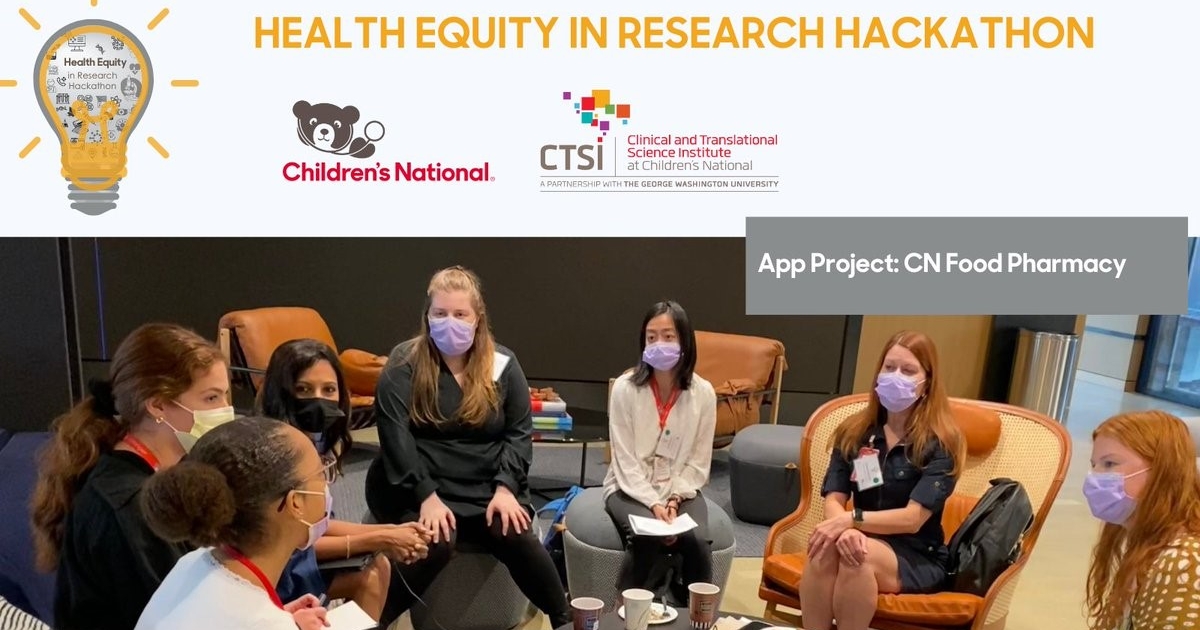We’re always looking for innovative ways to address health equity in our local community. Today’s post covers our Health Equity in Research Hackathon. The Hackathon was led by Children’s National’s Center for Translational Research within the Children’s National Research Institute, and was supported by the Child Health Advocacy Institute. Inspired by the MIT “Engineering Health Equity” Hackathon, this team-based collaborative competition challenged us to find new, creative ways to address health equity issues using technology.
We hosted Part 1 of the Hackathon in September 2023. We asked researchers and advocates to “think big” about how technology, specifically apps, can help address health equity. Of the 17 impressive applications we received, 3 were selected to move forward:
Children’s Checklist App
The “Children’s Checklist App” will help families successfully navigate the necessary pre-operative checklist, resulting in earlier scheduled surgery, on-time arrivals to the surgical waiting area, better adherence to important pre-operative conditions, including fasting guidelines, as well as completion rates of necessary pre-operative paperwork for surgical clearance. One significant obstacle to proper surgical care among lower socioeconomic populations is compliance with pre-operative conditions, pre-operative paperwork clearance and on-time arrival at the surgical center. Failure to adhere to any one of the above-enumerated factors can lead to delayed surgery and care, and has the potential to create inequitable access to health care. The Children’s Checklist App will address this inequity and assist patients and their families in overcoming institutional barriers to surgical care. In particular, by creating a streamlined but critical app that identifies milestones or checklists necessary surgery, the app will allow for improved interface between Children’s National and the patient community that it serves.
Food Pharmacy App
The “Food Pharmacy App” will streamline the current paper-based process that families in our Diabetes clinic use to receive food at the hospital’s food bank. The app will allow families to log food preferences, update contact information, have the ability to put a delivery/pickup on hold, reschedule, or disenroll, and to provide real time feedback to the Children’s National team. It can also include an intake form link for new families to receive services, provide convenient communication between Food Pharmacy staff and families through text messaging, include nutrition education and tips/recipes/etc. for managing Type 2 diabetes. Currently, families are provided services every 3 months during visits, but the app would allow more frequent communication and feedback.
Determine More App
The “Determine More App” will leverage patient entered data collection and subsequent analysis to provide a cost-effective, discreet method of obtaining relevant social information that has the potential to impact health, while considering the perspective of the patient. Information about housing, income, education, transportation, language and literacy, complex health needs, and impact of racism and/or violence, and more will be presented in a concise dashboard format. This can be used by patients and providers to track unmet social needs over time, allow providers to better understand patient perspectives regarding the impact of their unmet needs, as well as gather metadata that has the potential to inform population health initiatives working towards health equity. This app provides value to patients in two important ways: (1) enhances patient ability to advocate for social needs that matter most to them, and (2) connects patients to relevant community resources through a widely used resources such as findhelp.org. Opportunities exist to create an even more interactive platform that could periodically check in with patients on the status of social determinants between medical visits, create appointment and other health maintenance reminders, as well as provide legal information and resources that can be used to support them during interactions with landlords, law enforcement, school systems, etc.
On September 16th from 12pm – 5pm, we gathered at Children’s National’s Research and Innovation Campus for Par1 of the Health Equity Hackathon where attendees worked in diverse teams to discuss and refine the selected app ideas. They learned from technical and scientific experts and brainstormed app-based approaches to address health equity. By the end of the day, the three teams turned their raw ideas into compelling pitches that were evaluated by a panel of judges based on a set of criteria.
After much deliberation, the judges selected the Food Pharmacy App as the winner! Since that time, the Food Pharmacy team has worked on fine-tuning their ideas and creating app specifications. This weekend – March 4-5, 2023 – the app will move from ideas on paper to a functioning app at HackTJ.
HackTJ is a student-run hackathon sponsored by one of the area’s top public high schools: Thomas Jefferson High School for Science and Technology. During HackTJ students will have 24 hours to learn how to code and/or work with their peers to make app ideas come to life. We submitted the “Food Pharmacy App” as one of the potential products to build. HackTJ is open to any and all current high school students. Children’s National Hospital is a proud Gold Sponsor of HackTJ.
We’re looking forward to what the weekend will bring! We’ll post an update on HackTJ soon – it should be an energetic and productive event!
About the author

Chaya Merrill, DrPH
Director of Child Health Data Labwithin the Child Health Advocacy Institute at Children's National Hospital




